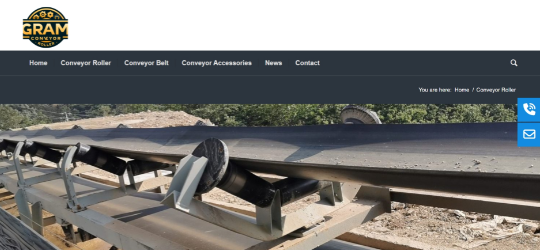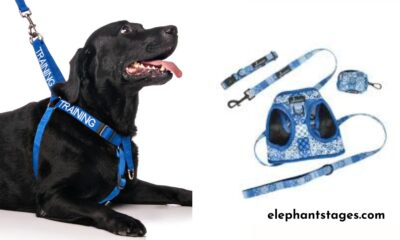Tech
Choosing the Right Conveyor Roller for Your Needs

Selecting the right conveyor roller is crucial for ensuring the efficiency and longevity of a conveyor system. The appropriate roller type can significantly impact the smooth transportation of materials, reduce maintenance costs, and enhance overall productivity. Conveyor rollers come in various types, each designed to meet specific industrial needs. These include steel rollers for heavy-duty applications, rubber-coated rollers for improved grip and noise reduction, and nylon rollers known for their durability and corrosion resistance. Understanding the unique features and benefits of each type helps in making informed decisions, tailored to the demands of different operational environments.
Conveyor Roller Types
Conveyor rollers are an essential component in many types of conveyor systems, facilitating the movement of products and materials along the conveyor path. The design, material, and application of the rollers can significantly impact the efficiency and effectiveness of the conveyor system. Below, we delve into the various types of conveyor rollers, highlighting their specific characteristics, uses, and benefits.
Gravity Rollers
Gravity rollers are the simplest form of conveyor rollers. They do not require any external power to function, relying solely on gravity to move items along the conveyor path. These rollers are commonly used in warehouses and distribution centers where the transportation of goods can be done manually or by the natural slope of the conveyor system.
Key Characteristics:
Material: Typically made from steel or aluminum.
Cost-effective: Low initial and maintenance costs.
Durability: Suitable for handling medium to heavy loads.
Applications:
– Packaging lines
– Assembly lines
– Order picking and fulfillment areas
Powered Rollers
Powered rollers, also known as live rollers, are driven by motors and can transport products automatically. These rollers are ideal for applications requiring precise control over the movement of items.
Key Characteristics:
Material: Usually made from steel, but can also be coated with rubber or plastic for specific applications.
Variable Speed: Can be adjusted to control the speed of the conveyor.
Efficiency: High throughput capabilities.
Applications:
– Manufacturing lines
– Distribution centers
– Automated sorting systems
Plastic Rollers
Plastic rollers are lightweight and corrosion-resistant, making them suitable for specific environments where traditional metal rollers might not perform well.
Key Characteristics:
Material: High-quality plastic such as polypropylene or nylon.
Lightweight: Easier to handle and install.
Corrosion-resistant: Ideal for use in wet or corrosive environments.
Applications:
– Food processing
– Chemical manufacturing
– Cleanrooms
Stainless Steel Rollers
Stainless steel rollers are known for their durability and resistance to corrosion, making them ideal for heavy-duty applications and harsh environments.
Key Characteristics:
Material: High-grade stainless steel.
Durable: Can withstand heavy loads and harsh conditions.
Hygienic: Easy to clean and maintain.
Applications:
– Pharmaceutical manufacturing
– Food and beverage industry
– Outdoor conveyor systems
Rubber-Coated Rollers
Rubber-coated rollers provide additional grip and cushioning, making them suitable for handling delicate or fragile items.
Key Characteristics:
Material: Steel core with a rubber or urethane coating.
Shock Absorption: Reduces damage to products during transportation.
Traction: Improved grip on items.
Applications:
– Glass and ceramics transport
– Electronics manufacturing
– Textile industry
Conical Rollers
Conical rollers are used in curved sections of conveyor systems, allowing for smooth and consistent movement around bends.
Key Characteristics:
Material: Can be made from steel, aluminum, or plastic.
Tapered Design: Facilitates smooth navigation around curves.
Customizable: Available in various sizes and taper angles.
Applications:
– Airport baggage handling
– Parcel sorting facilities
– Manufacturing plants with curved conveyor lines
Polyurethane Rollers
Polyurethane rollers are designed for applications requiring a combination of durability, chemical resistance, and noise reduction.
Key Characteristics:
Material: Polyurethane-coated steel or aluminum core.
Chemical Resistance: Suitable for use in environments with exposure to oils, solvents, and other chemicals.
Quiet Operation: Reduces noise during conveyor operation.
Applications:
– Automotive industry
– Heavy equipment manufacturing
– Aerospace industry
Conveyor Impact Rollers
Conveyor impact rollers are reinforced to absorb shock and prevent damage to both the conveyor system and the materials being transported.
Key Characteristics:
Material: Steel or rubber-coated steel.
Shock Absorption: Designed to handle high-impact areas.
Durability: Long-lasting even under extreme conditions.
Applications:
– Mining operations
– Bulk material handling
– Quarry conveyor systems
Choosing the right type of conveyor roller is crucial for optimizing the efficiency and longevity of a conveyor system. Each type of roller offers unique benefits tailored to specific applications and environments. By understanding the characteristics and applications of each roller type, businesses can select the best solutions to meet their operational needs.
Best Nylon Conveyor Rollers
Nylon conveyor rollers are a popular choice in many industries due to their unique blend of strength, durability, and lightweight properties. They are particularly valued for their resistance to wear and corrosion, making them suitable for a wide range of applications. In this section, we will explore the characteristics of high-quality nylon rollers and provide recommendations on some of the best products and brands in the market.
Characteristics of High-Quality Nylon Rollers
Understanding the key characteristics of high-quality nylon rollers can help in selecting the best products for your needs. Below are some essential features to consider:
Material Composition
High-quality nylon rollers are made from premium nylon materials that offer excellent mechanical properties. The best rollers often use high-density nylon, which provides superior strength and durability.
High-Density Nylon: Offers better load-bearing capacity and wear resistance.
Additives: Some nylon rollers are enhanced with additives to improve specific properties, such as UV resistance or anti-static capabilities.
Durability and Wear Resistance
Nylon rollers are known for their long lifespan and ability to withstand harsh environments. They exhibit excellent wear resistance, which is crucial for maintaining performance over time.
Wear Resistance: Ensures longevity and reduces maintenance costs.
Impact Resistance: Can handle shocks and impacts without cracking or deforming.
Lightweight
One of the main advantages of nylon rollers is their lightweight nature. This makes them easier to install and reduces the overall weight of the conveyor system, which can be beneficial for certain applications.
Ease of Installation: Simplifies the assembly process.
Energy Efficiency: Reduces the energy required to drive the conveyor system.
Corrosion Resistance
Nylon rollers are highly resistant to corrosion, making them ideal for use in environments where they might be exposed to chemicals, moisture, or other corrosive substances.
Chemical Resistance: Suitable for chemical manufacturing and food processing.
Moisture Resistance: Prevents degradation in humid or wet conditions.
Low Noise Operation
Nylon rollers operate quietly, which is an essential feature in environments where noise reduction is critical, such as in office buildings or hospitals.
Noise Reduction: Minimizes operational noise, contributing to a quieter working environment.
Recommended Products and Brands
Several brands and products stand out in the market for their superior quality and performance. Below are some of the best nylon conveyor rollers available:
GRAM Conveyor
The GRAM Conveyor is renowned for its high-quality nylon material and exceptional performance. These rollers are designed for heavy-duty applications and offer a combination of durability, lightweight, and easy maintenance.
Key Features:
– High-grade nylon material for excellent strength and wear resistance.
– Lightweight design for easy installation and energy efficiency.
– Corrosion-resistant properties suitable for various industrial environments.
Applications:
– Mining operations
– Manufacturing plants
Interroll – Polyamide Rollers
Interroll is a well-known name in the conveyor industry, and their polyamide rollers are among the best in the market. These rollers are made from high-quality polyamide, a type of nylon known for its robust performance and versatility.
Key Features:
– High load-bearing capacity.
– Excellent wear and impact resistance.
– Low friction and noise levels.
Applications:
– Material handling
– Distribution centers
– Packaging lines
Dyno – Nylon Rollers
Dyno offers a range of nylon rollers designed for various industrial applications. Their rollers are appreciated for their durability and efficiency, making them a reliable choice for demanding environments.
Key Features:
– Made from high-density nylon for enhanced durability.
– Corrosion-resistant and suitable for wet environments.
– Lightweight and easy to install.
Applications:
– Mining operations
– Manufacturing plants
– Warehouses
Conveyor Units – Nylon Conveyor Rollers
Conveyor Units provides high-quality nylon conveyor rollers known for their resilience and long service life. These rollers are designed to handle a wide range of materials and operating conditions.
Key Features:
– Premium nylon construction for superior strength and wear resistance.
– Smooth and quiet operation.
– Resistant to chemical and environmental corrosion.
Applications:
– Airport baggage handling
– Automotive industry
– Pharmaceutical manufacturing
Selecting the best nylon conveyor rollers involves considering factors such as material composition, durability, weight, corrosion resistance, and noise levels. The recommended products and brands listed above are known for their high quality and performance, making them suitable for various industrial applications. By choosing the right nylon rollers, businesses can ensure efficient and reliable operation of their conveyor systems, leading to improved productivity and reduced maintenance costs.
Conveyor Roller with Bracket
Conveyor rollers with brackets are essential components in many conveyor systems. They provide the necessary support and stability for the rollers, ensuring efficient and smooth operation. In this section, we will discuss the importance and functionality of conveyor rollers with brackets, as well as explore the various types of brackets and their applications.
Importance and Functionality
1. Support and Stability
Brackets play a crucial role in supporting conveyor rollers, maintaining their alignment, and ensuring they remain securely in place. This support is vital for the smooth and efficient movement of goods along the conveyor system.
Proper Alignment: Brackets ensure that rollers are correctly aligned, preventing deviations that could disrupt the flow of materials.
Secure Attachment: They provide a stable and secure attachment point for rollers, minimizing the risk of dislodgement or misalignment.
2. Load Distribution
Brackets help distribute the load evenly across the conveyor rollers, reducing the stress on individual rollers and enhancing the overall durability of the system.
Even Load Bearing: Ensures that the load is evenly distributed, preventing excessive wear on any single roller.
Enhanced Durability: By reducing localized stress, brackets contribute to the longevity of the conveyor system.
3. Ease of Maintenance
Conveyor rollers with brackets are designed for easy installation and maintenance. This feature helps minimize downtime and ensures the conveyor system remains operational.
Quick Replacement: Brackets allow for the quick and easy replacement of rollers, reducing maintenance time.
Modular Design: Many brackets are part of modular systems, making it easier to maintain and upgrade conveyor components.
Types of Brackets and Their Applications
There are various types of brackets used in conveyor systems, each designed for specific applications and operational requirements. Below, we explore some common types of brackets and their typical uses.
1. Fixed Brackets
Fixed brackets are the most basic type of conveyor roller bracket. They hold the roller in a fixed position and are suitable for applications where the conveyor path is straight and does not require frequent adjustments.
Applications:
– Simple straight conveyor lines
– Warehousing and distribution centers
– Manufacturing assembly lines
2. Adjustable Brackets
Adjustable brackets allow for the positioning of conveyor rollers to be modified. This flexibility is beneficial in applications where the conveyor path may need to change or where different roller positions are required to accommodate various load sizes.
Applications:
– Customizable conveyor systems
– Flexible manufacturing processes
– Assembly lines with varying product sizes
3. Swivel Brackets
Swivel brackets enable the rollers to pivot or rotate, allowing for greater flexibility in handling materials. These brackets are ideal for applications that involve curved conveyor paths or where items need to be redirected smoothly.
Applications:
– Curved conveyor sections
– Sorting and redirecting systems
– Parcel handling and distribution
4. Hinged Brackets
Hinged brackets are designed to allow the rollers to be easily lifted or moved aside. This feature is particularly useful for cleaning, maintenance, and quick access to the conveyor belt.
Applications:
– Food processing and packaging
– Pharmaceutical manufacturing
– Conveyor systems requiring frequent cleaning and maintenance
5. Spring-loaded Brackets
Spring-loaded brackets provide a cushioning effect, allowing the roller to absorb shocks and impacts. This type of bracket is useful in applications where the conveyor system handles heavy or irregular loads.
Applications:
– Mining and quarrying
– Heavy-duty material handling
– Impact zones in conveyor systems
6. Custom Brackets
Custom brackets are designed to meet specific requirements of unique conveyor applications. These brackets can be tailored to fit unusual conveyor layouts, specialized roller types, or specific environmental conditions.
Applications:
– Specialized industrial processes
– Custom-built conveyor systems
– Environments with unique operational challenges
Conveyor rollers with brackets are essential for the efficient and reliable operation of conveyor systems. They provide critical support, stability, and load distribution, ensuring that rollers function optimally. The variety of bracket types available allows for customization to meet specific application needs, enhancing the versatility and adaptability of conveyor systems. By understanding the importance and functionality of different brackets, businesses can select the best solutions to improve their conveyor operations, leading to increased efficiency, reduced downtime, and lower maintenance costs.
Carrying Roller Conveyor Belt
A carrying roller conveyor belt is a fundamental component in the smooth operation of conveyor systems. These belts, supported by carrying rollers, are essential for transporting materials efficiently from one point to another. In this section, we will explore the role of carrying roller conveyor belts in conveyor systems, key features that make them effective, and maintenance tips to ensure their longevity and reliability.
Role in Conveyor Systems
1. Material Transportation
The primary role of carrying roller conveyor belts is to transport materials efficiently across different stages of processing or handling. These belts are widely used in various industries to move bulk materials, packages, or products from one location to another.
Continuous Movement: Ensures a steady flow of materials, reducing manual handling and increasing operational efficiency.
Versatility: Suitable for transporting a wide range of materials, including raw materials, finished products, and packaging.
2. Support and Stability
Carrying rollers provide crucial support to the conveyor belt, ensuring it remains stable and aligned during operation. This stability is vital for maintaining the integrity of the transported materials and the conveyor system itself.
Belt Alignment: Prevents the belt from sagging or misaligning, which can cause operational disruptions.
Load Distribution: Evenly distributes the weight of the transported materials, minimizing wear and tear on the belt.
3. Enhanced Efficiency
By providing a smooth and consistent surface for material movement, carrying roller conveyor belts enhance the overall efficiency of the conveyor system. They reduce friction and resistance, allowing for faster and more reliable transportation.
Reduced Energy Consumption: Lower friction means less energy is required to move the belt, leading to cost savings.
Increased Throughput: Facilitates faster movement of materials, boosting productivity.
Key Features
1. Durable Material
Carrying roller conveyor belts are made from durable materials that can withstand the rigors of industrial environments. The choice of material affects the belt’s performance, longevity, and suitability for specific applications.
Rubber: Commonly used for its flexibility, strength, and resistance to abrasion.
PVC: Offers good chemical resistance and is suitable for food-grade applications.
Polyurethane: Known for its excellent wear resistance and load-bearing capacity.
2. Robust Design
The design of carrying roller conveyor belts is tailored to handle the specific demands of the materials they transport. This includes considerations for load capacity, speed, and environmental conditions.
Reinforced Construction: Ensures the belt can handle heavy loads without stretching or deforming.
Impact Resistance: Designed to absorb shocks and impacts, protecting both the belt and the materials.
3. Customizability
Carrying roller conveyor belts can be customized to meet the specific needs of different industries and applications. Custom features might include specific belt widths, lengths, and surface textures.
Belt Width and Length: Customized to fit the dimensions of the conveyor system and the size of the transported materials.
Surface Texture: Can be smooth or textured to accommodate different types of materials and improve grip.
Maintenance Tips
1. Regular Inspection
Frequent inspection of the conveyor belt and carrying rollers is essential to identify any signs of wear, damage, or misalignment. Early detection of issues can prevent major breakdowns and extend the belt’s lifespan.
Visual Checks: Look for signs of wear, such as fraying edges or surface cracks.
Roller Alignment: Ensure carrying rollers are properly aligned and rotating smoothly.
2. Proper Lubrication
Lubricating the moving parts of the conveyor system, including the carrying rollers, reduces friction and wear. Use the appropriate lubricant recommended by the manufacturer to maintain optimal performance.
Scheduled Lubrication: Follow a regular lubrication schedule to ensure all moving parts operate smoothly.
Avoid Over-Lubrication: Excess lubricant can attract dust and debris, causing additional wear.
3. Belt Tensioning
Maintaining the correct tension in the conveyor belt is crucial for its efficient operation. An improperly tensioned belt can slip, cause misalignment, or suffer excessive wear.
Tension Adjustments: Regularly check and adjust the belt tension as needed to maintain optimal performance.
Avoid Over-Tensioning: Excessive tension can strain the belt and rollers, leading to premature failure.
4. Cleaning and Debris Removal
Keeping the conveyor belt and rollers clean is vital for preventing material buildup that can cause operational issues. Regular cleaning helps maintain the efficiency and longevity of the conveyor system.
Routine Cleaning: Clean the belt and rollers regularly to remove dirt, dust, and debris.
Preventative Measures: Implement measures to minimize debris accumulation, such as installing scrapers or guards.
Carrying roller conveyor belts are integral to the effective functioning of conveyor systems, providing essential support, stability, and efficiency in material transportation. By understanding their role, key features, and maintenance requirements, businesses can ensure these belts operate reliably and efficiently. Regular maintenance and proper care are crucial for maximizing the lifespan and performance of carrying roller conveyor belts, leading to enhanced productivity and reduced operational costs.
Impact Roller Compactor
An impact roller compactor is a powerful piece of machinery used in the construction and civil engineering industries to compact soil and other materials. This equipment is essential for creating stable and durable surfaces, whether for roads, foundations, or other infrastructure projects. In this section, we will delve into the purpose and usage of impact roller compactors, along with their key benefits and the industries they serve.
Purpose and Usage
1. Soil Compaction
The primary purpose of an impact roller compactor is to compact soil to increase its density and stability. This process is crucial for preparing construction sites, ensuring that the ground can support structures and withstand environmental stressors.
Achieving Desired Density: Ensures that the soil reaches the required density for stability and load-bearing capacity.
Reducing Settling: Compacted soil minimizes the risk of future settling, which can lead to structural damage.
2. Foundation Preparation
Impact roller compactors are extensively used in preparing foundations for buildings, roads, and other infrastructure. By compacting the ground, they create a solid base that can support heavy loads.
Uniform Compaction: Provides a consistent and even compaction across the entire foundation area.
Enhanced Load Bearing: Strengthens the foundation to support the weight of structures and traffic.
3. Road Construction
In road construction, impact roller compactors play a vital role in creating a stable and durable base layer. This layer is essential for the longevity and performance of the road.
Subgrade Compaction: Ensures that the subgrade is properly compacted to prevent road failures.
Improved Surface Quality: Leads to smoother and more durable road surfaces.
Key Benefits
1. Efficiency and Speed
Impact roller compactors are known for their efficiency and speed in compacting large areas of soil quickly. This capability significantly reduces the time required for site preparation and construction.
High Productivity: Can cover large areas rapidly, speeding up the compaction process.
Cost-effective: Reduces labor and time costs associated with soil compaction.
2. Deep Compaction
Unlike traditional compactors, impact roller compactors can achieve deep compaction, making them suitable for projects that require substantial soil stabilization.
Effective Depth: Can compact soil to greater depths, ensuring comprehensive ground stabilization.
Versatility: Suitable for various soil types and conditions.
3. Versatile Application
Impact roller compactors can be used in a wide range of applications, from small construction projects to large-scale infrastructure developments.
Adaptability: Can be used in different terrains and soil conditions.
Wide Range of Uses: Applicable in various stages of construction and civil engineering projects.
4. Reduced Environmental Impact
Modern impact roller compactors are designed to be environmentally friendly, reducing emissions and noise levels. This makes them suitable for use in urban areas and sensitive environments.
Low Emissions: Compliant with environmental regulations, reducing the carbon footprint.
Noise Reduction: Operate quietly, minimizing noise pollution in populated areas.
Industries Served
1. Construction
The construction industry heavily relies on impact roller compactors for site preparation, foundation work, and road building. Their ability to compact soil quickly and effectively makes them indispensable for constructing durable and stable structures.
Residential Construction: Preparing foundations for houses and residential complexes.
Commercial Construction: Compaction for commercial buildings and facilities.
2. Civil Engineering
Civil engineering projects, such as highways, bridges, and dams, require robust ground compaction to ensure structural integrity. Impact roller compactors are essential in achieving the required soil density for these projects.
Road and Highway Construction: Creating stable bases for roads and highways.
Bridge Foundations: Ensuring the ground can support heavy bridge structures.
3. Mining
In the mining industry, impact roller compactors are used to stabilize the ground for mining operations and to prepare sites for the construction of mining facilities.
Site Preparation: Compacting soil for mining infrastructure.
Tailings Management: Stabilizing tailings storage areas to prevent erosion and contamination.
4. Agriculture
Impact roller compactors also find use in agriculture for tasks such as preparing fields for planting and constructing farm roads. Proper soil compaction can improve field drainage and road durability.
Field Preparation: Enhancing soil structure for better crop yields.
Farm Infrastructure: Building durable farm roads and pathways.
Impact roller compactors are vital tools in various industries, offering efficient and effective soil compaction for a wide range of applications. Their ability to provide deep and uniform compaction, coupled with their versatility and environmental benefits, makes them essential for modern construction, civil engineering, mining, and agricultural projects. Understanding their purpose, usage, and benefits can help industries maximize their potential and ensure the success of their projects.
Tech
AI in Automotive Design: Accelerating Innovation with Simulation and Modeling

The automotive industry is in a revolution age and the key technology that stands out right now is the Artificial Intelligence or AI. In a world where consumers demand more sustainable, efficient, and intelligent vehicles, AI is proving to be the key to unlocking the next generation of automotive design. This is because AI is making it possible for automotive companies to come up with safe, up-to-date and more efficient vehicles by accelerating innovation through advanced simulation and modeling techniques.
These new tools are extending the frontiers of creativity in automotive design, shrinking time to market, and increasing performance to cost ratios. AI is being used to accelerate change in the process of designing automobiles.
- Accelerating the Design Process
Typically, automotive design goes through a number of cycles and covers a large number of steps – often taking months or even years. Conventional design optimization is modifying this with the help of AI that can create faster and accurate simulation results regarding the vehicle performance even before the physical prototypes is constructed. Here is a free tool to test, visit wateen speed test.
- Generative Design: One of the most popular AI technologies in automotive design is Generative design. Design goals, constraints, and materials are given as inputs by engineers to an AI algorithm, and the AI displays five different solutions.
It assists the engineers in evaluating a large number of design solutions that maybe beyond their imagination when done manually. These designs can be optimized by the AI for weight, strength and even aerodynamics, this makes for reduction in the use of the material as well improves on the performance of the product.
- Simulation Automation: AI simulations offer designers an opportunity to evaluate models in conditions that are difficult to exercise in reality. For example, how a car will run after an accident or after some time, at low temperatures, or in other unfavorable circumstances. However, with the aid of high end AI, these simulations can be carried out at a go and much more efficiently than physically assembling and disassembling physical models.
- Enhanced Predictive Modeling
AI is also significantly transforming the concept of predictive modeling through which automotive companies are able to predict how a certain vehicle is going to act in real world situations. Sustainability, fuel consumption, and safety analysis requires the use of predictive models.
- AI-Powered Crash Simulations: Different sets of AI algorithms work with large sets of data from previous crash tests, and together with models, they create new hypothetical scenarios and then forecast the outcomes of future testing. Thus, it contributes to certain safety of automobiles as well as would enable the manufactures to meet legal requirements in a better manner.
- Aerodynamics Optimization: With the help of AI simulations, the vehicles are experiencing the improvements of their aerodynamics and, in particular, the decrease of the air drag. Hence through machine learning algorithms engineers can train models which learn from previous designs and apply on new shapes of vehicles. This leads to better fuel economy, enhanced firmness and lesser emissions.
- Material Innovation and Light weighting
AI has given researchers the capability to analyze and to simulate the elements in the materials on the microscopic level, thus giving automobile designers a new set of materials to work with. This is especially important for the increasing need of electric vehicles for which using lightweight designs can significantly increase range and performance. To verify PTCL internet connection speed, it’s a free tool to test your ptcl speed test.
- Material Property Predictions: AI models can predict how different materials will behave under various conditions, helping designers choose the best materials for different parts of the vehicle. This then results to lighter structures with higher integrity and improved sustainability. Using AI, it is possible to propose materials and alloys that will provide specific strength and the most minimal weight possible.
- Battery Optimization for EVs: Even in electric cars, AI plays an important role to enhance the durability of car batteries and their capacity output. AI can model the behavior of battery cells and their use to make some enhancements on design, safety measures and charging. This in turn enables designer to develop effective battery systems without relying on costly trial-and-error testing.
- Personalized Design with AI
Another way that AI is enhancing automotive designs is enabling more personalized vehicle designs, which is becoming increasingly important in the era of customer-centric automotive experiences.
- Customization and Personalization: Such variables make it possible for the application of AI to analyze customer needs and recommend design changes. Starting with the interiors of the car to individual performance characteristics, AI system can assist manufacturers in building cars as per the consumer’s preference. This could be simple display of different widgets, changing basic color schemes, or even fine tuning of how the dashboard performs based on user’s preferences.
- Human-Centric Design: AI also aids in ergonomic design because it can determine how they use vehicles. AI-driven simulations can predict how comfortable a person will be in the car, whether it’s in terms of seating positions, dashboard layout, or visibility. This results in more intuitive, user-friendly designs that enhance the overall driving experience.
- Collaborative Design and Innovation
AI also encourages collabration in automotive design especially in cases where it has to be done alongside engineering and marketing departments. AI tools promote seamless communication between teams, making it easier to share data and design ideas across global offices and supply chains.
- AI-Driven Platforms for Collaboration: AI is being adopted by many automotive originals in the form of design platforms where engineers, designers and business teams work concurrently. These applications simply propagate what is design data, simulation, and performance prediction, thus, keeping everybody in synch.
- Open Innovation with AI: AI also enables open innovation in automotive manufacturing by making it easier for automotive companies to engage with other entities at the startup level and academia. An organization can use AI algorithms to source for information from different databases meaning that new ideas or technologies can be easily incorporated into the automotive design process.
Conclusion
The integration of AI in automotive design is revolutionizing the industry, from speeding up the design process and enabling predictive modeling to creating more personalized and efficient vehicles. By leveraging simulation, modeling, and AI-driven tools, automotive manufacturers can reduce costs, improve safety, and bring innovative designs to market faster than ever before. As AI technology continues to evolve, it will undoubtedly further accelerate the innovation process, helping to shape the future of the automotive industry.
Tech
Elevate Your Business with a Swiss Webagentur Crafting Modern and Personalized Websites

In today’s digital age, standing out online is crucial for businesses of all sizes. A Swiss webagentur can be your secret weapon in achieving a competitive edge. Known for their innovation, quality, and precision, these agencies provide modern and personalized web solutions tailored to your specific needs. Whether you’re a small business, entrepreneur, or startup, understanding the Swiss webagentur landscape could transform your online presence.
Understanding the Swiss Webagentur Landscape
The Reputation of Swiss Web Agencies
Switzerland is synonymous with precision, quality, and innovation across multiple industries, and web development is no exception. Swiss web agencies, or webagenturs, bring a unique level of craftsmanship to the table, ensuring that every project is executed with utmost attention to detail. This reputation has been built over years of delivering exceptional digital solutions that not only meet but exceed client expectations.
Swiss webagenturs pride themselves on their commitment to innovation. They are always at the forefront of new technologies and design trends, ensuring that their clients receive cutting-edge websites that captivate and engage users. This dedication to staying ahead of the curve sets them apart from agencies in other countries and makes them a sought-after choice for businesses looking to make a mark online.
The Importance of Local Expertise
For businesses operating within Switzerland, partnering with a local webagentur offers a distinct advantage. Local agencies bring an in-depth understanding of the cultural and business nuances that can significantly impact a website’s effectiveness. They are familiar with regional preferences, languages, and market dynamics, enabling them to create websites that resonate with the local audience.
This cultural understanding is particularly important in the design and content creation phases. Swiss webagenturs can ensure that the look and feel of your website align with the expectations of Swiss consumers, enhancing user experience and increasing the likelihood of conversion. Additionally, local agencies are well-versed in Swiss regulations and compliance standards, ensuring your website meets all necessary legal requirements.
Bridging the Gap Between Tradition and Modernity
One of the unique strengths of Swiss webagenturs is their ability to blend traditional Swiss values with modern design principles. Switzerland has a rich heritage of craftsmanship and attention to detail, which is seamlessly integrated into the web development process. By combining these traditional values with contemporary design aesthetics, Swiss webagenturs create websites that are both visually stunning and highly functional.
This approach resonates with both established businesses looking to maintain their brand’s legacy and startups seeking to make a bold statement. The result is a website that not only reflects the brand’s identity but also appeals to a broad audience, regardless of age or industry.
The Role of a Swiss Webagentur for Small Businesses, Entrepreneurs, and Startups
Tailoring Solutions for Diverse Needs
Small businesses, entrepreneurs, and startups each have unique challenges and opportunities. A Swiss webagentur understands these differences and excels in tailoring web solutions to meet diverse needs. By working closely with their clients, they develop websites that align with business goals and target audiences.
Swiss webagenturs offer a personalized approach, taking the time to understand the specific requirements of each client. Whether developing a simple informational website for a local business or a complex e-commerce platform for a startup, they ensure the final product is perfectly aligned with the client’s vision and objectives.
Driving Business Growth and Engagement
In the digital age, a website is often the first point of contact between a business and its customers. A professionally designed and managed website serves as a powerful tool for driving business growth and enhancing customer engagement. Swiss webagenturs excel in creating visually appealing and user-friendly websites that leave a lasting impression.
Through strategic design and thoughtful user experience (UX) considerations, Swiss webagenturs optimize websites for conversions. They focus on clear calls to action, intuitive navigation, and engaging content that keeps visitors coming back for more. By creating a seamless online experience, they help businesses build trust with their audience and foster long-term relationships.
Scalability and Flexibility for the Future
One of the key advantages of working with a Swiss webagentur is the scalability and flexibility they offer. They understand that businesses evolve, and websites need to adapt to changing needs and technologies. Swiss webagenturs build websites with future growth in mind, ensuring they can easily accommodate new features and functionalities as businesses expand.
This scalability is particularly valuable for startups and rapidly growing businesses. Swiss webagenturs employ modular design principles and the latest technologies to ensure websites can handle increased traffic, new product lines, and changing market demands. By future-proofing their digital presence, businesses can focus on growth without worrying about technical limitations.
Design Principles and Features Offered by a Swiss Webagentur
Modern and Personalized Design Principles
Swiss webagenturs are known for their commitment to modern and personalized design principles. They understand that every business is unique, and their websites should reflect this individuality. Through a combination of creativity and technical expertise, they deliver designs that are not only visually stunning but also aligned with the brand’s identity.
Modern design principles prioritize simplicity, elegance, and user-centricity. Swiss webagenturs excel in creating clean and intuitive interfaces that prioritize user experience. They pay attention to typography, color palettes, and layout to ensure that every element serves a purpose and enhances the overall aesthetic.
Scalable and Easy-to-Manage Features
A key aspect of any successful website is its ability to grow and adapt as the business evolves. Swiss webagenturs prioritize scalability and ease of management, ensuring that businesses can easily update and expand their websites as needed. They leverage content management systems (CMS) that empower clients to make changes without technical expertise.
With a focus on user-friendly interfaces and streamlined workflows, Swiss webagenturs provide training and support to ensure businesses can effectively manage their websites. This empowers businesses to maintain their online presence independently, reducing reliance on external developers and minimizing ongoing costs.
Seamless Integration of Advanced Technologies
Swiss webagenturs stay at the forefront of technological advancements, integrating cutting-edge tools and technologies into their websites. From responsive design that ensures optimal viewing on any device to advanced analytics that provide valuable insights, they leverage technology to enhance the user experience and drive business success.
By incorporating technologies such as artificial intelligence (AI), chatbots, and personalized recommendations, Swiss webagenturs create websites that deliver personalized experiences and foster customer engagement. These innovations enable businesses to differentiate themselves in a competitive market and provide added value to their customers.
Case Studies Real-Life Success Stories
Transforming Local Businesses with Digital Solutions
Many Swiss businesses have experienced remarkable transformations through their partnerships with webagenturs. Take, for example, a local bakery that sought to expand its reach beyond its physical location. By collaborating with a Swiss webagentur, they developed an e-commerce platform that allowed customers to order products online and have them delivered to their doorstep.
Through strategic branding and intuitive design, the bakery’s online presence became an extension of their physical store, attracting new customers and increasing sales. This success story highlights the impact a well-designed website can have on a local business’s growth and customer base.
Overcoming Startup Challenges with Innovative Design
Startups often face unique challenges in establishing their brand identity and capturing market attention. A Swiss webagentur partnered with a tech startup to create a visually striking website that communicated the company’s innovative solutions and expertise. By incorporating interactive elements and compelling storytelling, the website effectively conveyed the startup’s value proposition.
The startup saw a significant increase in website traffic and lead generation, ultimately leading to successful funding rounds and business expansion. This case study showcases how a Swiss webagentur can help startups overcome challenges and achieve their goals through creative design and strategic messaging.
Building Trust and Credibility for Established Enterprises
Even established enterprises can benefit from a fresh digital presence that enhances their brand image and credibility. A Swiss webagentur worked with a renowned financial institution to revamp their outdated website and create a modern, user-friendly platform. By focusing on clear communication and intuitive navigation, the agency ensured that visitors could easily find the information they needed.
The revamped website not only improved user engagement but also positioned the financial institution as a leader in the industry. This case study demonstrates how a Swiss webagentur can breathe new life into established businesses, helping them stay relevant and competitive in the digital landscape.
Choosing the Right Swiss Webagentur for Your Business
Key Considerations When Selecting a Web Agency
Choosing the right Swiss webagentur is a crucial decision that can significantly impact the success of your web project. To ensure you make the best choice, consider the following factors:
- Portfolio Review: Take the time to review the agency’s portfolio of past projects. Look for designs that align with your aesthetic preferences and demonstrate their ability to deliver quality work.
- Customer Testimonials: Seek out testimonials and reviews from past clients to gauge their satisfaction with the agency’s services. Positive feedback and case studies can provide valuable insights into the agency’s expertise and professionalism.
- Pricing and Budget Alignment: Discuss pricing and budget considerations upfront to ensure there are no surprises later in the process. A transparent and collaborative approach to pricing will help establish a strong working relationship.
The Importance of Collaboration and Communication
Effective collaboration and communication are essential for the success of any web project. A Swiss webagentur should prioritize open and transparent communication, keeping you informed at every stage of the process. Look for an agency that values your input and actively seeks your feedback.
A collaborative partnership ensures that your vision is accurately translated into the final product. Regular check-ins and progress updates allow for adjustments and refinements along the way, resulting in a website that meets your expectations and business goals.
Trusting the Experts in Web Design and Development
While it’s important to have input in the design process, it’s equally crucial to trust the expertise of the webagentur. Swiss webagenturs bring years of experience and industry knowledge to the table, allowing them to recommend best practices and innovative solutions.
Trusting their expertise can lead to a more efficient and effective web project. By leveraging their insights and technical skills, you can ensure your website is optimized for performance, user experience, and future growth.
Conclusion
In today’s digital landscape, a Swiss webagentur can be the key to elevating your business’s online presence. Their reputation for innovation, quality, and cultural understanding sets them apart as leaders in web design and development. By partnering with a Swiss webagentur, you can benefit from modern and personalized websites that drive business growth and customer engagement.
Whether you’re a small business, entrepreneur, or startup, the insights shared in this article can guide you in making informed decisions about your web strategies. Consider the unique value that a Swiss webagentur brings, and take the first step toward a successful online presence today.
If you’re ready to explore the possibilities of partnering with a Swiss webagentur, reach out to us for a consultation. Our team is here to help you achieve your digital goals and unlock the full potential of your business.
Tech
Solar Panel Suppliers Near Me: Choose a Solar Installation Firm

Looking for the best solar panel suppliers near you? Choosing the right solar installation firm is key to saving money and energy. With so many options available, it can be hard to know where to start.
In this guide, we share some simple tips to help you pick the right solar company for your home. From experience to customer service, these tips will lead you to the best choice. Read on and learn more.
Look for Experience
When choosing a solar company, always check their experience. Firms with more years in the business are more likely to understand the best practices for installation. They also know how to handle challenges that may arise during the process.
Reputable companies can also recommend the best types of solar panels for your home. This ensures you get the most out of your energy-saving investment. Ask the company how long they’ve been in the solar industry before you make a decision.
Check Their Certifications
Certifications show that a solar installer meets industry standards. A certified installer is more likely to follow safety protocols and offer quality service. Look for certifications like NABCEP (North American Board of Certified Energy Practitioners) for a reliable company.
Certified installers are also more knowledgeable about the latest technology. This means they can offer more efficient systems and better results. Always ask to see the certifications before hiring a solar installer.
Read Customer Reviews
Customer reviews are a great way to gauge the quality of service. Read both positive and negative reviews to get a balanced view. Look for trends in the feedback, like how the company handles problems or how satisfied people are with the installation.
Reviews can also provide insight into solar installer fees and how the company treats its customers. If the reviews are mostly positive, it’s a good sign. However, if there are many complaints about delays or poor service, you may want to look elsewhere.
Compare Multiple Quotes
Don’t settle for the first company you find. Get quotes from at least three different firms. This helps you compare prices and see what each company offers in terms of service and warranties.
Comparing quotes also gives you a sense of the market rate for solar installation. Some companies may offer lower prices, but that doesn’t always mean better service. Be sure to weigh the cost against the quality of the work.
Ask About Warranties
Warranties protect you if something goes wrong with your solar panels. A good solar company will offer warranties on both the equipment and the installation. This ensures that if anything breaks or malfunctions, you’re covered.
The best solar installers will offer long-term warranties. These can last anywhere from 10 to 25 years. Make sure you understand what the warranty covers before you hire a solar installer.
Evaluate Their Customer Service
Good customer service is crucial when dealing with a solar installation firm. You want a company that answers your questions quickly and clearly. They should be willing to explain the installation process and address any concerns you have.
Companies with strong customer service are easier to work with. They can also help if you need repairs or adjustments after the installation is complete. Check how responsive they are before making your final decision.
Verify Their Licensing
A licensed solar installer is legally allowed to install solar panels in your area. Check with your local government to make sure the company you’re considering is properly licensed. This can protect you from issues later on.
Licensing also ensures that the installer follows state and local regulations. This reduces the risk of problems during or after installation. Always ask to see the company’s license before moving forward.
Ask About Financing Options
Solar panels can be expensive upfront, but many companies offer financing options. These options make it easier to afford solar energy. Ask if the solar company provides loans, leases, or payment plans to fit your budget.
Different financing options come with different benefits and costs. Be sure to understand the terms before signing any agreements. This can help you choose the option that best fits your financial situation.
Make Sure They Offer Maintenance Services
Solar panels require occasional maintenance to perform their best. Some solar companies include maintenance in their packages, while others charge extra for it. It’s important to know what the company offers before you sign a contract.
A solar installer that offers maintenance services can help keep your system running efficiently for years. This ensures you continue to benefit from energy savings and lower bills. Be sure to ask about the cost of maintenance when comparing solar installer fees.
Check Their Knowledge of Local Regulations
Every area has different regulations regarding solar energy. A good solar installer will be familiar with local codes and permits. This ensures the installation process goes smoothly and meets all legal requirements.
Local regulations can affect the type of system you can install and how much energy you can generate. By hiring a knowledgeable installer, you avoid potential issues and delays. If you’re in the Portland area, make sure to check out this full page for trusted services that can help you on your journey to sustainable energy.
Choose a Company That Supports Green Energy
A firm that promotes green energy is more likely to be passionate about solar power. These companies often offer the latest technologies and best practices. They’re also more likely to focus on sustainability and environmental responsibility.
Choosing a company that supports green energy ensures you’re working with a team that shares your values. They will be committed to helping you reduce your carbon footprint. This makes your solar energy investment even more rewarding.
Make the Right Choice with Solar Panel Suppliers
Choosing the right solar panel suppliers is important for a successful solar installation. By following the tips in this guide, you can find a company that meets your needs and budget. Look for experience, certifications, and good customer service.
Don’t forget to check reviews and compare quotes. The right supplier will help you save energy and money in the long run. Take your time and choose wisely for the best results.
Did this article help you? Browse our blog for more interesting topics.
-

 News6 months ago
News6 months agoWhat Are the Biggest Challenges in Marine Construction Projects in Australia?
-

 Fashion6 months ago
Fashion6 months agoAttractive Beach Dresses: Elevate Your Look with These Ideas
-

 Health7 months ago
Health7 months agoUnderstanding Ftmç: Gender-Affirming Surgery
-

 Pets5 months ago
Pets5 months agoPawsitively Perfect: The Types of Dog Harness Bundle for Your Furry Friend
-

 Business6 months ago
Business6 months agoHow Professional Concrete Cleaning Wins Repeat Business
-

 Entertainment5 months ago
Entertainment5 months agoNetnaija: Your One-Stop Shop for Free Movies in Africa
-

 Tech6 months ago
Tech6 months agoAiyifan: Unveiling the Genie of Technological Revolution
-

 Health6 months ago
Health6 months agoDesk Job Dilemma: Tips for Back Pain Relief
